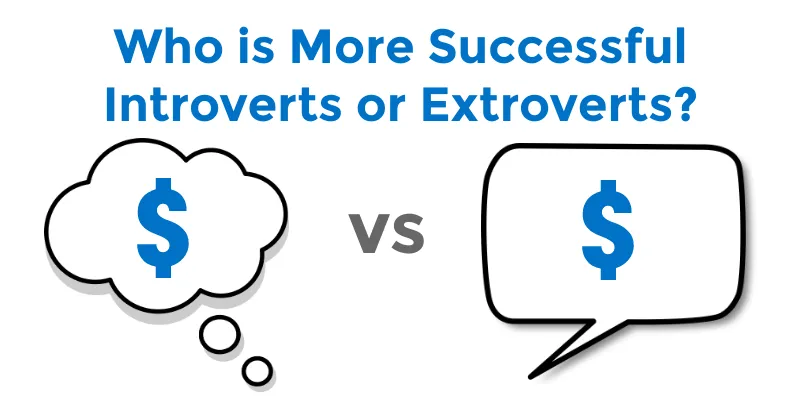The question of whether introverts or extroverts are more successful is a slippery one to answer. Just as everyone is different on the extroversion scale, everyone’s definition of success is different.
Both introverts and extroverts are successful and no one has become successful by being a pure introvert or a pure extrovert. The richest people on earth; introverts have the edge. Who makes the most money at work; extroverts. The most successful CEOs; introverts. Who gets promoted more; extroverts.
One commonality of high performers is being able to balance the advantages of introversion and extroversion.
Would you believe that Bill Gates (Top 3 richest person in the world) is an extrovert? I had always assumed he was an introvert but his Myers Briggs personality is extroverted.
Introverts will have to stretch themselves to some more extroverted behaviours at times, such as speaking up, taking risks and socializing above their comfort zone.
Extroverts may need to slow down and be less reactive or learn to listen more to be an effective leader.
Introverts and extroverts are going to have different advantages and strengths in both the professional and personal realms. For the sake of this article, we are going to focus on professional.
The short answer is that you can be successful whether you are an introvert or an extrovert. You don’t have to change who you are to win.
Let’s look at some different areas of success to understand why different personality types tend to achieve more. This can help you understand more about your own unique personality and how you can best pursue success while being true to yourself.
Who earns more money: introverts or extroverts?
Starting with the easiest definition of success to measure, let’s look at money.
If you want to be a billionaire and have more money than 99.99% of us, it seems that introverts have the edge.
Here are the Top 10 Richest People on Earth (as of mid-2019):
- Jeff Bezos, $131B
- Bill Gates, $96B
- Warren Buffet, $82B
- Bernard Arnault, $76B
- Carlos Slim Helu, $64B
- Amancio Ortega, $62B
- Larry Ellison, $58B
- Mark Zuckerberg, $62B
- Michael Bloomberg, $55B
- Larry Page, $50B
While it was difficult to nail down everyone’s personality, more than half of the people on this list are introverts. I’m still protesting that Bill Gates is on Team Extrovert too.
People like Jeff Bezos (Amazon) and Larry Page (Google) built their empires around technology, while Warren Buffet (Berkshire Hathaway) built a fortune in the investment world. It is fair to argue that building technology and studying markets fit into the introvert stereotype.
These men didn’t just master their craft, however. They built massive companies which required leadership and communication skills (including public speaking) which are usually thought of as extroverted strengths.
The ability to leverage your strengths as an introvert has to be balanced with tapping into the strengths of extroverts, and vice versa.
Who earns more in the workplace, introverts or extroverts?
On average, extroverts earn more in the workplace than introverts. The most common route to a higher salary is taking on a management role.
A 2015 study on career progression by personality type showed that typically, extroverts occupy more managerial roles and have responsibility for more people than introverts.
In the study, about two-thirds of introverted respondents had no supervisory role in their position. For extroverts, the number was closer to half.
The author’s theory on this was that introverts were less inclined to take on managerial roles, while extroverts were more likely to be interested in them. This line of thinking says that the earning power is not linked to skills levels or competence, but the willingness to take on these types of roles.
In her book, Quiet: The Power of Introverts in a World That Can’t Stop Talking, Susan Cain said that introverts are less driven by financial rewards. This is reflected in decisions to either avoid managerial roles or to pursue less lucrative careers that were more personally fulfilling.
Who does better at work: introverts or extroverts?
Making money is one measure of success at work, but money aside is there a difference between introverts and extroverts in career progression?
This is where the extrovert strengths of risk-taking and speaking up can make a big difference. If you don’t ask, the answer will always be no.
Extroverts will be more likely to ask for the promotion than introverts. They will also be more likely to talk themselves up to their bosses and peers.
In my corporate career, I watched opportunities go to more “out there” colleagues because of my reluctance to aggressively ask for the promotion or the big project. My thinking was that if I did my work well, it would be recognized and I would be rewarded.
Talking about my successes or pushing my career prospects publicly at work felt like bragging and was not comfortable for me.
Is there an extrovert bias in the workplace?
A survey of 150,000 people in the UK in 2016 by Sutton Trust suggests so.
“Our analysis of the data confirmed the importance of extraversion. We found that highly extraverted people – those who were more confident, sociable or assertive – had a 25% higher chance of being in a high-earning job.”
Author and business journalist, Suzy Welch, agreed saying in a recent CNBC interview that she has personally observed “happy extroverts” get promoted ahead of others for decades.
“I’ve watched the happy extrovert phenomenon play out in companies of every kind,” she said. Welch went on to say that the impact these personality types have on morale, rather than being more qualified, makes them a favourite with bosses.
Cain has often spoken publicly about the extrovert bias, calling on executives to look past the bias and see the unrecognized talents of introverts.
Who makes better leaders, introverts or extroverts?
With their outgoing personalities and greater willingness to take on leadership roles, it is easy to assume that extroverts make better leaders than introverts.
Leadership is not just about a willingness to be in the spotlight, however. As we saw with the list of the richest people in the world, many of these leaders are introverts who supplemented the natural strengths with the ability to lead and communicate strongly.
A 10-year study in the US called the CEO Genome Project looked at CEO performance versus the personality traits of the leaders.
The analysis showed that while boards tend to prefer charismatic extroverts, introverts are slightly more likely to surpass the expectations of their boards and investors.
“The biggest aha, overall, is that some of the things that make CEOs attractive to the board have no bearing on their performance,” said Elena Lytkina Botelho, a partner at ghSmart and a co-founder of the project.
“Like most human beings, they get seduced by charismatic, polished presenters. They simply do better in interviews.”
A study by the National Bureau of Economic Research came up with data showing that CEOs who scored highly in extroversion ran companies with a 2% lower return on assets than the average. Introverted CEOs ran companies that outperformed their peers.
Popular Wharton management professor Adam Grant and colleagues from Harvard and the University of North Carolina wanted to challenge the assumption that extroverts made the best leaders. What they found was that introvert and extrovert leaders do better or worse depending on the personalities they lead.
The study, Reversing the Extraverted Leadership Advantage: The Role of Employee Proactivity, found that extroverted leaders may hamper performance because they see proactive behaviour from subordinates as a threat to their leadership. Introvert leaders, on the other hand, worked well with these types of employees as they were more likely to listen to suggestions and to encourage employees to step up and be proactive.
Grant and his colleagues found that in the case of a US pizza chain, extroverted leaders drove higher profits when leading non-proactive employees and introverts did likewise with proactive employees.
This is an interesting case study to argue that neither introverts or extroverts are inherently better leaders.
Matching the strengths and preferences of the leader to their team can be the key to successful leadership for introverts and extroverts.
Who is more successful introverts or extroverts?
If you purely look at the statistics there are winners and losers between introverts and extroverts in wealth, leadership and career success. Look a little deeper and the evidence suggests both introverts and extroverts can be successful in all these realms.
The theme that surfaced through all these areas of success was that introverts and extroverts have to find a balance between leveraging their strengths and working on the areas they consider their weaknesses.
While both sides of the scale need to leverage what they do best, no truly successful people have been able to completely rely on their introvert or extrovert strengths, without being able to stretch themselves to achieve some balance.




